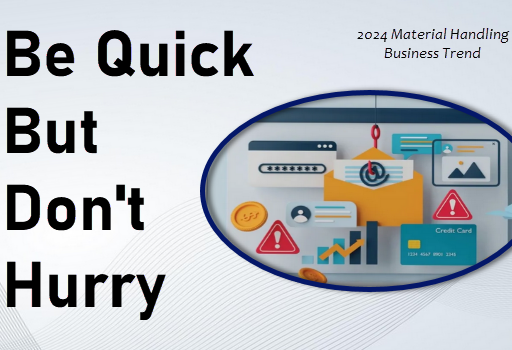Be Quick, But Don’t Hurry
With equipment theft rising, take the time to know your customer.
By Nick Fortuna
Dealers of material handling equipment pride themselves on providing responsive customer service, and in a highly competitive marketplace, speed of delivery can mean the difference between making a sale and losing it.
But amid rising rates of equipment theft by sophisticated criminals, MHEDA members should remember the words of legendary basketball coach John Wooden, who often would instruct his UCLA Bruins to “be quick, but don’t hurry.” When equipment distributors cut corners and ignore red flags because prospective customers demand immediate action, they significantly increase their risk of getting burned.
Just ask the owners of the 120 stolen forklifts and other pieces of industrial machinery found in a warehouse in Inglewood, California, in August 2022. Police investigating the theft of two forklifts searched the warehouse and discovered millions of dollars of stolen equipment stored for resale.
Police said criminals were removing the serial numbers and repainting the equipment, making it extremely difficult for law enforcement agencies to track them down. The high-profile case called attention to a nationwide problem that’s affecting large equipment dealers, mom-and-pop operations, insurers and legitimate customers, who face increased scrutiny and higher costs to purchase or rent equipment.
Cary Roulet, vice president for material handling and compact construction at Holt of California, said criminals are looking to steal all types of equipment, including forklifts, diesel generators, skid steer loaders and telehandlers. In most cases, theft rings pose as legitimate customers facing emergencies or immediate deadlines, pressuring dealers to provide equipment before they can perform their due diligence.
“A lot of dealers have been hit, and a common thread is that these criminals are always in a hurry,” Roulet said. “They’ve got to have that equipment now. By creating that sense of urgency, they increase their chances of tripping you up, and that’s how you lose your machine.”
A Familiar Scheme
Steve Strenck, Director of Sales for Gregory Poole Lift Systems, said his company is approached by fraudsters at least once a week. Since the criminals don’t have established relationships with local or regional sales representatives, they typically reach out to dealers using the contact information on their websites, or they may target specific employees on LinkedIn.
Many thieves have done their homework, so they’re comfortable using industry terminology in phone calls and emails in an attempt to sound legitimate, Strenck said. They typically will ask for quotes on specific pieces of equipment and then tell sales professionals that they’re comparing prices from several suppliers.
“They’re skilled communicators, so you’ll have a volley of emails with them, just like a normal customer,” Strenck said. “They know model numbers, and they can talk specifications, so that makes it feel real. They email us constantly, and now we know what to look for, but they’re still very active and very aggressive in trying to get people to fall for it.”
One day, out of the blue, the sales professional receives a fake purchase order that’s virtually indistinguishable from that of a legitimate company. The customer almost always needs the product as soon as possible, either because a key piece of equipment has broken down or because the customer is opening a new facility imminently, Strenck said.
To speed up the process, the customer may offer to pick up the equipment rather than having the dealer deliver it. A third-party freight company will show up with a bill of lading that it believes to be legitimate and will haul the equipment from the dealership to the customer.
Most of the time, neither the dealer nor the freight company gets paid, or if the equipment is being rented, maybe the first month’s check will clear. But the fake customer never responds to subsequent invoices, emails or phone calls, and when sales professionals eventually venture out to the address provided by the customer, they know for sure that they’ve been scammed.
Either there never was a business operating at that address, or everyone left a while ago, taking the equipment with them. Theft rings know how to disable tracking devices on equipment, and once a stolen forklift disappears behind the walls of a different warehouse, the chances of recovering it are slim. “By the time you realize it’s not a real business, it’s way too late,” Strenck said.
Given the strong demand for material handling equipment, stolen machinery could end up just about anywhere, traveling through seaports to foreign countries or by truck to another state. Strenck said prices for forklifts and industrial equipment have risen by as much as 30% over the past few years, mainly due to higher costs for materials and labor, incentivizing thieves to step up their activity. Strenck said he routinely forwards suspicious emails to law enforcement agencies, but since these equipment thefts are nonviolent crimes, overwhelmed police departments typically allocate their limited resources elsewhere.
“I’ve told the police that all they need to do is set up a sting, and I’d help them do it, but they just don’t have the time for it,” he said.
Performing Due Diligence
For MHEDA members, avoiding so called false-pretense or fraud-and-deceit equipment theft often comes down to pausing to ask the right questions and to vet prospective customers.
Existing customers typically will reach out directly to their local or regional sales reps instead of using the general contact information on dealers’ websites, so if someone claiming to represent an established client sends an inquiry to the general sales email address, that’s a red flag, Strenck said. Dealers should call someone they know at that company and confirm that the inquiry is legitimate, he added. In addition, if it’s a new facility or a new customer, the sales professional should visit the location in person to confirm that it’s a legitimate business.
“You very rarely get a large order from a new customer after a few emails,” Strenck said. “There’s usually extensive dialogue, so make sure you get the customer on the phone and have a conversation that feels real. And then be sure somebody goes out and vets the facility. Be cautious, and don’t ship equipment if you’re not sure whom you’re dealing with.”
Equipment distributors can vet potential customers through the Better Business Bureau or business credit-reporting and risk-management services such as Dun & Bradstreet. They also can ask potential customers for business references and ask their peers in the industry if they’ve ever done business with a particular customer.
Even then, however, dealers aren’t totally in the clear, Roulet said. Holt of California recently got a credit application listing a number of legitimate company executives whose information checked out. But the main point of contact listed on the inquiry was someone posing as a company executive. Had Holt not called the company’s headquarters to verify that employee’s legitimacy, the company likely would have been scammed.
Holt also now requires customers to have a delivery address, even if they want to pick up the equipment, saying it’s necessary for the warranty.
“I won’t let someone take a machine out of here without a delivery address, and that has thwarted several theft attempts,” Roulet said. “If something doesn’t feel right, go to that company’s public-facing website, call their headquarters and ask if that person works for them. Ask to talk to their CFO or upper management.
“One of our customers recently asked to see a copy of a fake purchase order we received, and they were in disbelief over how good it was.”
Check Your Insurance Policy
When brazen thieves break into a dealership and make off with expensive equipment, the distributor’s losses typically are covered under its property insurance policy. But that’s not necessarily the case with false-pretense theft since dealers in those cases willingly sold or rented their equipment to customers who later proved to be bad actors, according to Patrick J. Cunningham, national account executive for Federated Insurance.
Unless their insurance policies include a specific endorsement covering false pretense theft, dealers likely won’t be compensated for their losses, which is why Federated Insurance offers false pretense endorsements to all policyholders, Cunningham said.
“It’s an important discussion that we have with all of our dealers whenever we provide a quote,” he said. “Most of our dealers have very sound practices in place to protect their equipment, but criminals’ level of sophistication has increased, and they’re finding unique ways to get around those protections, so it’s a moving target.”
Glenn R. Jacobs, executive vice president at Fairview Insurance Agency Associates, said false-pretense endorsements are relatively inexpensive additions to standard insurance policies. “These incidents are becoming more-common claims scenarios, and if it happens, you’ll be happy you have that coverage,” he said.
Most insurance carriers also offer loss prevention analyses and best practices to policyholders in an effort to minimize their losses, Jacobs said. Equipment distributors who have questions about safeguarding their property from theft should reach out to their insurance agent for assistance, he added.
“Frequency is worse than severity,” Jacobs said. “If you have a claim, that’s understandable, but if you have several similar claims, then there’s probably a problem, so most insurance companies will want to perform a loss-control survey for the dealership and ask what the dealership is doing to prevent it from happening again.”
Likewise, Cunningham said Federated Insurance offers seminars on loss prevention and risk management to its clients and encourages them to participate.
“We always say that if you’re in doubt, reach out to us,” he said.




